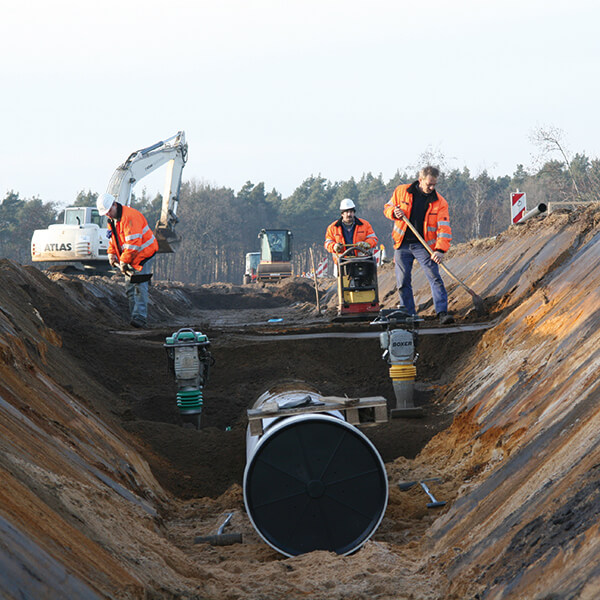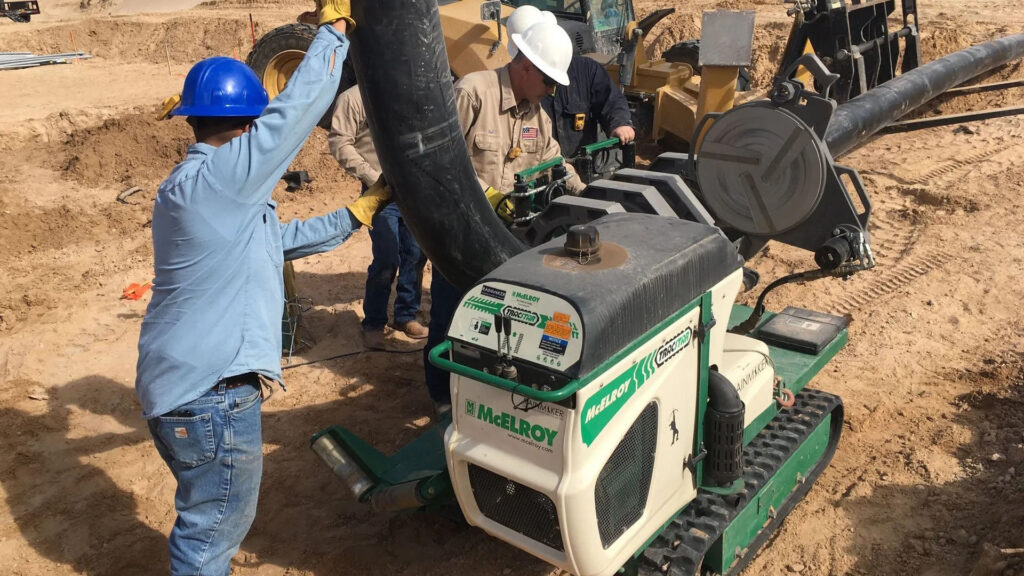The Vital Guide to Understanding Pipeline Construction Providers and Their Significance
Pipeline Construction solutions are essential to the transport of important resources such as gas, oil, and water. These services entail thorough planning and execution, sticking to rigorous security and ecological requirements. As the industry adapts to modern-day challenges, comprehending its effects and components ends up being progressively important. What aspects add to the growing significance of these services in today's economic climate? The complying with sections will certainly check out these essential facets.
Overview of Pipeline Construction Solutions
Pipeline Construction solutions encompass a variety of tasks necessary for the installment and maintenance of pipes used to deliver different substances, including gas, water, and oil. These services are critical for assuring the safe and efficient movement of sources from one area to another. The process normally starts with complete preparation and layout, which thinks about governing needs, ecological considerations, and logistical difficulties.
Once planning is complete, excavation and grading of the land are conducted to prepare the website for Pipeline installment. This is complied with by the real laying of the pipelines, which includes welding or signing up with areas together to develop a continuous circulation course. After setup, rigorous screening is executed to guarantee honesty and safety. Maintenance solutions are likewise supplied to resolve any kind of problems that may occur with time. In general, Pipeline Construction services play an essential function in supporting infrastructure for energy and water circulation.
Key Components of Pipeline Construction
A successful Pipeline Construction task depends on a number of key elements that assure the effective and secure installation of the Pipeline system. Detailed website evaluations are important, as they recognize the environmental and geographical elements that may impact Construction. Next, the option of proper materials, such as fittings and pipelines, is necessary for protecting durability and compatibility with the delivered materials.
Advanced Construction methods, including trenchless modern technology and directional boring, boost performance and decrease environmental influence. Efficient task administration is another crucial element, working with labor, tools, and timelines to satisfy project objectives.
Furthermore, communication among stakeholders, including designers, specialists, and local authorities, assurances alignment on project specifications and needs. Ultimately, comprehensive quality assurance actions throughout the Construction procedure guarantee compliance with market standards and take full advantage of the Pipeline's operational life expectancy. Jointly, these elements develop the backbone of an effective Pipeline Construction project.
Safety And Security Specifications and Laws in Pipeline Construction

Boosting Regulative bodies, such as the Occupational Security and Health Management (OSHA) and the Pipeline and Hazardous Materials Security Management (PHMSA), stated specific needs that regulate Construction practices. These include protocols for equipment use, worker training, and emergency situation reaction procedures. By implementing these criteria, Construction firms not just shield their workers yet likewise safe and secure public trust. Eventually, extensive precaution contribute to the lasting success of Pipeline tasks, guaranteeing they satisfy both operational and ecological expectations.
Ecological Factors To Consider in Pipeline Projects

Ecological considerations are integral to the preparation and execution of Pipeline tasks. These jobs must assess prospective impacts on ecosystems, water sources, and local wildlife. Performing thorough environmental impact analyses (EIAs) is important, enabling stakeholders to determine and reduce dangers prior to Construction begins.
Safeguarding sensitive areas, such as environments and wetlands, commonly calls for applying details style functions or alternative routing to lessen disturbance. Furthermore, Pipeline drivers are tasked with establishing approaches for stopping spills and leaks, which can have devastating impacts on the setting.
Engagement with regional neighborhoods is crucial, as public issues can cause task modifications that enhance environmental management. Conformity with regulations set by environmental companies assures that jobs fulfill sustainability standards, fostering a balance between facilities needs and environmental conservation. Inevitably, resolving ecological considerations not just safeguards nature yet also promotes community count on and job viability.
The Role of Technology in Pipeline Construction
Technology plays a vital role in contemporary Pipeline Construction, improving efficiency and accuracy. Advanced surveying strategies allow for specific planning and implementation, lessening ecological influence and task hold-ups. Furthermore, the combination of automation and robotics simplifies operations, reducing labor prices and boosting safety and security on Construction see this websites.
Advanced Checking Techniques
Advanced surveying strategies play an essential role in the effective execution of Pipeline Construction jobs. These techniques take advantage of advanced technology to ensure exact mapping and analysis of the terrain where pipes will be mounted. Strategies such as Geographic Information Equipment (GIS), LiDAR (Light Discovery and Ranging), and 3D modeling enable designers to picture and evaluate the landscape, determining environmental issues and possible challenges. By making use of these sophisticated devices, teams can boost accuracy in placing and positioning, significantly lowering the danger of mistakes during Construction. Furthermore, real-time data collection enables for immediate modifications and educated decision-making throughout the project lifecycle. Inevitably, these surveying technologies add to boosted efficiency, security, and sustainability in Pipeline Construction initiatives.
Automation and Robotics

Economic Impact of Pipeline Framework
Pipeline infrastructure plays an important duty in promoting and shaping local economic situations profession. By offering a reliable ways of transporting oil, gas, and other products, pipes lower transportation expenses and improve supply chain performance. This infrastructure draws in financial investment, boosts job development, and promotes financial development in surrounding areas.
The Construction and maintenance of pipelines add considerably to local economies, creating numerous employment opportunities in various fields, from engineering to labor. The increase of work typically causes increased spending in local companies, additionally strengthening economic activity.
Additionally, pipes enhance power safety by ensuring a stable supply of next sources, which is crucial for industrial operations and domestic demands. As regions become adjoined with Pipeline networks, they access to wider markets, boosting competitiveness and financial strength. Subsequently, the economic effect of Pipeline infrastructure is diverse, influencing both instant neighborhood economic climates and more comprehensive local growth.
Future Fads in Pipeline Construction Services
The future of Pipeline Construction services is advancing in action to technological innovations, regulative modifications, and expanding environmental factors to consider. Advancements such as drones and robotics are streamlining examination and upkeep procedures, boosting safety and efficiency. Automation is poised to reduce labor prices and boost precision in Construction operations. Additionally, the enhancing emphasis on sustainability is triggering firms to take on eco-friendly products and methods, straightening with global efforts to reduce carbon impacts.
Governing structures are likewise adapting to deal with ecological impacts, promoting higher transparency and liability in Pipeline tasks. In addition, the integration of clever technologies, consisting of real-time monitoring systems, is anticipated to boost the reliability and performance of Pipeline networks. As energy needs change towards eco-friendly sources, Pipeline Construction solutions will likely see a rise in tasks connected to biofuels and hydrogen transportation. Overall, these patterns suggest a transformative duration for the Pipeline Construction sector, concentrated on technology and sustainability.
Frequently Asked Questions
What Kinds of Pipelines Are Commonly Built?
Various kinds of pipelines are typically created, consisting of oil, gas, sewer, and water pipelines - Pipeline Construction Services. Each offers unique purposes, promoting the transportation of vital sources across areas while sticking to safety and ecological laws
For how long Does a Normal Pipeline Project Take?
The duration of a normal Pipeline job differs considerably, often varying from a number of months to a couple of years. Elements influencing this timeline consist of task intricacy, regulative authorizations, and environmental considerations that have to be resolved.
Who Regulates Pipeline Construction Companies?
Pipeline Construction business are controlled by various government, state, and regional agencies, consisting of the Pipeline and Hazardous Materials Safety Administration (PHMSA) and state utility commissions, making certain compliance with security and ecological standards throughout the Construction process.
What Are Usual Products Used in Pipeline Construction?
Usual products used in Pipeline Construction consist of pvc, polyethylene, and steel. Each material offers distinctive advantages such as resistance, toughness, and adaptability to deterioration, making them ideal for various applications in transferring gases and fluids.

Just How Are Pipeline Construction Prices Approximated?
Pipeline Construction expenses are estimated by examining variables such as material expenditures, labor prices, project intricacy, environmental considerations, and regulatory requirements (Pipeline Construction Services). Accurate price estimation assurances efficient budgeting and job planning throughout the Construction procedure
Pipeline Construction solutions include a range of tasks vital for the installment and upkeep of pipes utilized to deliver numerous compounds, including oil, water, and gas. A successful Pipeline Construction project depends on several vital parts that ensure the efficient and secure setup of the Pipeline system. Advanced evaluating methods play an important duty in the successful implementation of Pipeline Construction projects. Various types of pipes are typically built, consisting of oil, water, gas, and sewer pipes. Pipeline Construction expenses are approximated by evaluating elements such as material costs, labor rates, job complexity, environmental factors to consider, and regulatory requirements.